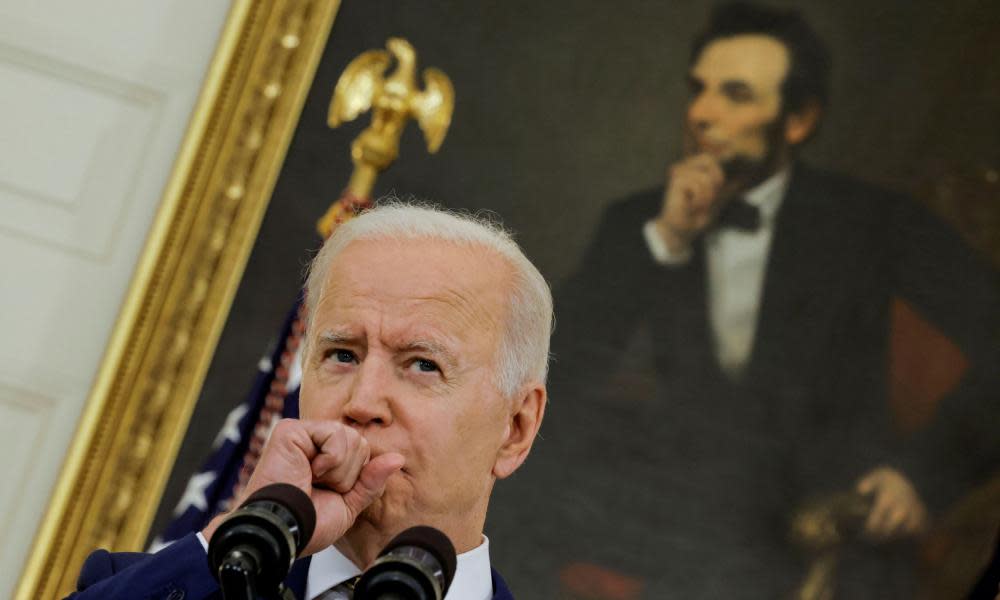Democrats’ domestic agenda bogged down by Republican obstructionism

- Oops!Something went wrong.Please try again later.
- Oops!Something went wrong.Please try again later.
- Oops!Something went wrong.Please try again later.
Joe Biden’s far-reaching domestic agenda in the US is facing serious setbacks on a range of issues as the political quagmire of a tightly contested Senate is seeing Democratic ambitions sharply curtailed in the face of Republican obstruction.
On a number of key fronts such as pushing election reform and voting rights, gun control and moving forwards on LGBTQ civil rights, there has been an effective pushback by Republicans – and a handful of conservative Democrats – that is forcing Biden and the wider Democratic party on to the back foot.
The Senate, which critics deride as an increasingly unrepresentative body that gives undue influence to smaller, less diverse Republican-run states, is scheduled to vote on Tuesday on For the People Act, the voting rights bill that’s certain to be defeated having won no support from Republicans.
Republicans are expected to run down the clock – a controversial tactical rule known as a filibuster – on the package that requires lawmakers to reach a 60-vote threshold.
On Sunday, the Ohio Republican senator Rob Portman shot down amendments proposed by West Virginia’s conservative Democrat Joe Manchin, whose rejection of the initial bill all but scuttled the Democrats’ project. Portman described the planned legislation as a “federal takeover of our election system”.
“The bottom line is we should make it easy to vote in this country. We should also make it hard to cheat,” Portman said on NBC’s Meet the Press. “Again, I appreciate [Manchin is] trying to find that middle ground, and, who knows, maybe something can be done.”
By forcing Republicans to carry out their filibuster and making their opposition clear and public to a law seen as defending the voting rights of communities of color, Democrats hope to embarrass the party. But – without destroying the filibuster, which Manchin also opposes – there is little chance of the bill passing.
Senate Democrats will also test calls for unity on LGBTQ civil rights, and another bill – the Equality Act – that is in search of Republican support. Schumer said last month the upper house is “considering” a vote on the bill but has yet to schedule it. Again, Manchin is the lone Democrat holdout.
The proposed legislation would include sexual orientation and gender identity to the protected classes of the 1964 Civil Rights Act alongside bans on discrimination based on race, color, religion and national origin.
The Wisconsin senator Tammy Baldwin, one of two openly gay senators in the 100-member chamber, has said that she is lobbying Republican colleagues but has achieved only “incremental progress”.
Baldwin has said she believes the Senate should “hold off” on a vote while “negotiations are productive” and progress is being made. The Senate is split 50-50 and only in Democratic control thanks to the tie-breaking vote of Vice-President Kamala Harris.
“There may be a time where there’s an impasse. I’m still trying to find 10 Republicans [to help pass the bill],” said Baldwin.
Republican resistance to the legislation is focused on protecting the rights of religious institutions that condemn homosexuality and opposition transgender rights in sports. Yet it comes against a backdrop of broad public, business and judicial support on the issue.
Manchin, an anti-abortion Democrat , has said he is “not convinced that the Equality Act as written provides sufficient guidance to the local officials who will be responsible for implementing it”. But he has also said he would seek to “build broad bipartisan support and find a viable path forward for these critical protections”.
Nor are Democrats currently likely to find broader opportunities for political unity on infrastructure spending where large-scale Democratic proposals are running into Republican counter-offers of a fraction of the size.
The former Republican presidential adviser Karl Rove told This Week with George Stephanopoulos that Biden faces two paths on infrastructure and both are riddled with obstacles. “[It will be] a bipartisan deal small enough to get Republican support, but not big enough to keep Democrats united, or a go-it-alone and go-for-broke plan that progressives want, with a price tag as high as $6tn that’s likely too big to pass,” Rove said.
Similarly, pending gun control legislation may also be resistant to winning enough support to pass.
As it stands, two House-passed bills to expand background checks on gun buyers have all but stalled in the Senate. But rather than push legislation that Republicans will reject, Democrats may instead push for a vote on increasing the number of online and gun show sales covered by FBI background checks – a significant retreat on the original proposals.
Senator Chris Murphy, the Democrats’ point person to win Republican support for gun control, said he was still talking with Republican leaders about “some ideas that would involve the expansion of background checks without getting all the way to universal”.
Asked if a bill on gun show checks would be favored by Republicans, two senators involved in discussions, Pennsylvania’s Pat Toomey and South Carolina’s Lindsey Graham, offered a cool take on that likelihood.
“We’ll see if it goes anywhere,” Graham told Politico.
Toomey, who is set to retire next year, said: “Honestly, it’s unclear at this point.”

